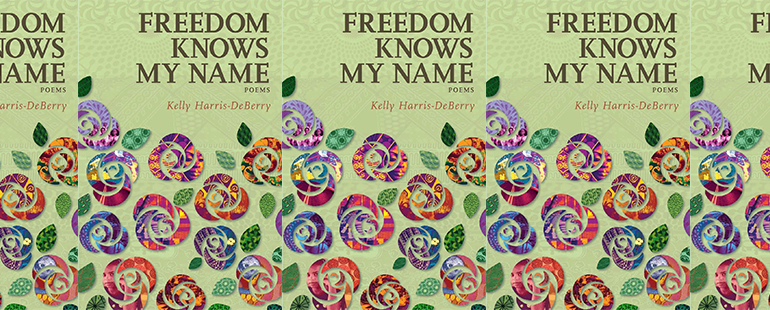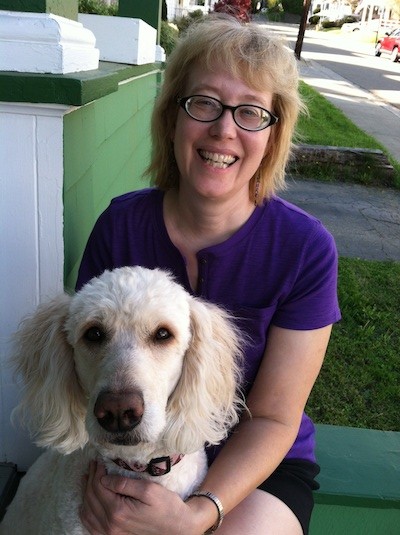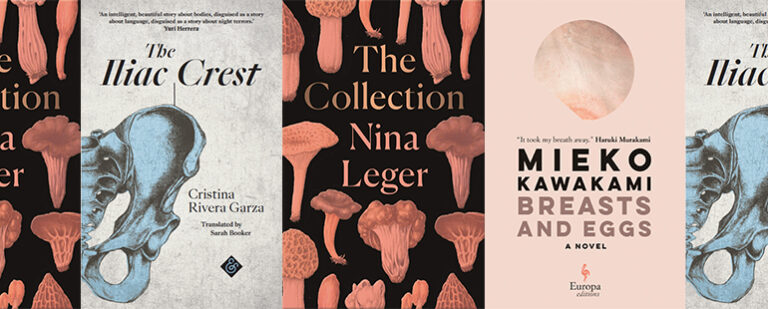“I used to think that I had to choose between the page and the musical aspect of it”: An Interview with Kelly Harris-DeBerry

The first time I saw Kelly Harris-DeBerry read, it was at a hotel lounge in New Orleans, at a memorial for a local author who had passed away. I hadn’t met or been acquainted with her work yet. Although I knew or had read all of the others on the list of readers, when I think back on that night, the reading I remember the most was Harris-DeBerry’s. I can still feel her piece in my bones. I remember her humming and snapping, the crowd keeping the beat, the cadence of the words that I didn’t know. I heard what she was trying to tell me, tell us. When Art Garfunkel heard Aretha Franklin’s version of “Bridge Over Troubled Water,” he said, she took that song “back to church.” I still don’t know the name of the poem Harris performed and I can’t recite a line, but I remember the feeling of her taking us all back to church.
When I saw she had a new book, Freedom Knows My Name, which includes recordings of her reading the poems within, out this summer, I knew I wanted to talk to her, get to know her. One of the things she mentioned is how a writer is more than a list of credentials. I can tell you that she has an MFA, but having now read much of her work, I can also tell you the emotions captured in her pieces were not learned in school. I can tell you her work as one of the outreach coordinators for Poets & Writers in New Orleans is rooted in her investment and love for her city. Harris-DeBerry has published multiple books, but every time you hear her do a piece, it sounds different from how it did when you were hearing it in your head, or from the last time she read it—the words are all feeling. Her biographical note, too, doesn’t include the brother who, when they were kids, would make a beat with his spoon and ask her to sing over it. It doesn’t mention the fish fries and noisy houses and preachers and women talking in beauty shops that taught her how to speak into the rhythm of what’s going on around you.
Harris-DeBerry published Freedom Knows My Name early this month, in the midst of a national conversation about racism and justice. As Harris-DeBerry told me, however, while the topics she covers within the feel of this moment—included are poems about Serena Williams battling racism, her own family’s migration from the South to the North then back south again, and mothers keeping their faith after losing their children to police brutality—she has been writing about them all of her life. You can trace the lines in Harris-DeBerry’s poems to people who loved and sought freedom, for themselves and their peoples—people like her grandfather and Judy Scott, the mother of Walter Scott, who was killed by police officers in 2015 in South Carolina. With Freedom Knows My Name, Harris-DeBerry wants to be in conversation with multiple groups of Black people, each of which has different thoughts on how best to acquire their individual and communal freedom. She uses her lyricism and her rhythm to deliver lines that are cathartic, that get stuck in your head, that you catch yourself repeating over and over again, that you ruminate on. She brings different characters, different loves, into one book so they can have a conversation with one another, and with each reader. Harris-DeBerry doesn’t write about freedom for her people like it is something she wrote about this “moment.” She writes about freedom like someone who has felt the word in her mouth for years, felt the shape and sound of it, and has used the instruments of her voice and her page to translate it into something we can all understand. These poems are rooted in the work she has been grounding herself in since the beginning.
Freedom Knows My Name includes pieces that talk about migration and identity, and that are dedicated to people (oftentimes Black women) who fight against the pressures the outside world puts on them, sometimes winning, sometimes coming up short. She turns a piece into a map of an otherwise unnamed gentrified city. She uses the repetition in “Strangers Looking to Buy My House (That’s Not For Sale),” keeping you singing along with the poem and its rhythm, the repetition hypnotizing you and reflecting what happens over and over again. You can hear the slowdown and enunciation in the line “Ain’t no waiting on heaven, I’ve already seen the afterlife” in the poem “I Still Believe,” the silence accentuating its meaning, exacerbating the echoes of silence left after the narrator’s son was killed. In one poem, Harris-DeBerry asks her grandfather, “Did you ever bring America home?”
In Freedom Knows My Name¸ Harris-DeBerry uses her voice and page as instruments to tell her stories. In a time when a pandemic has many of us isolated from our peoples, from conversations that ground us and help us progress, Freedom Knows My Name is an outstretched hand to a conversation that can’t stop, to a chorus we all know, to a mantra so many of us need. Harris-DeBerry has put it on the page, recorded it on the track, to let us capture a bit of normal, a bit of community, a bit of freedom. I recently talked to Harris-DeBerry about this work.
Christopher Romaguera: How do you approach writing your poetry?
Kelly Harris-DeBerry: The poems come to me in different ways, sometimes in sounds, sometimes I sketch poems out. My job as a poet is to be open to what that poem needs. Some poems require more of a voice, or a musical element to it. I used to think that I had to choose between the page and performance. I was never into slamming but I was in the spoken word community, then I went to graduate school. For a long time I felt I had to choose. Now, I’ve decided to bring both of those elements together.
CR: What are the key qualities for knowing when a poem is done?
KHD: Art is never done. When a poem can’t live off the page, when it has no breath–it’s done and not in a good way. Who wants to be done?
I think it’s really important to be able to put a poem in your mouth. That’s why Maya Angelou is still so popular. People can take her poems and stand in them and recite them. [As a child] I was made to recite poems. We don’t really have poems like that today unless their children’s poems. We want to be more complex, more sophisticated. There’s value in that . . . but I also think we need to make more room for the oral poems, and more room for folks to be able to access poetry.
CR: In every piece I’ve ever read or heard of yours, you play with rhythm. How do you go about writing rhythm into a piece?
KHD: Everything that I write, I sound it out. I can edit a lot of times by ear. My formal training tells me to write it this way, but my ear is like, ‘Nah, that’s not everything.’ The rhythm and the sound that you hear inside of the poetry is also a natural bridge back to the griot and Black poetry aesthetics before the popularity of MFA programs.
CR: What is your mindset when you go into a reading?
KHD: [That] I am not performing. My mindset is I am playing my instrument, my voice . . . I am trying to create a moment inside a poem.
In “How Fast Must She Run,” [I] pit Serena Williams against the horse American Pharoah. If you recall a few years ago many White people wanted the race horse to win Sports Person of the Year instead of Serena. What if I take this moment, and make it a poem, and make it work, to not just write about it, but to really make this poem come to life? And not just in performance, but as imagination. I don’t even know if this poem works, but I wanted to challenge myself. One thing I want people to say is that she tried to be innovative, not just as a writer, but as a sound maker. I want the audience to be forced to read and listen differently. I hate quiet poetry readings, you know the ones where you’re not sure if you can clap or not.
CR: How did you come about releasing an audio album with Freedom Knows My Name?
KHD: I wanted to be at the intersection of technology and traditional print. I think the writers who will thrive in an ever- changing- tech world will be the ones who embrace multiple ways of publishing. We all come to a book with a certain standard way of reading. But once you get the audio, it forces you to go back to the text and say, Oh, that kinda thing. Someone told me that they thought they had a “whole other book” with the audio. That “you literally have given us a whole other book.”
CR: Who do you write for? Or who do you envision reading and listening to your work?
KHD: I had a whole other manuscript, that was much more formal, but when I sat with it, I was like, I don’t know anyone who talks like this, I don’t even talk like this. It was important to me to make a book that I could bring home to my mama. I really came to writing through storytelling. I came to writing through hearing preachers preach and hearing old women talk, and hearing old women talk in the beauty shop.
When I go to folks’s homes, I talk to people who are not inside of writing communities, who would deem themselves not poetry readers, but have poetry books. They tend to have Langston Hughes, they tend to have Maya Angelou, they tend to have people that are accessible, and it’s important to me you can enjoy/understand my work without formal learning. I can’t tell you how many painful readings my mother has sat through to support me. I have a short poem in the book that speaks to this. On the surface it may seem simple but -think Langston Hughes’ Simple character.
CR: Do you feel that is a conflict or contrast between academic and spoken word spaces?
KHD: Certainly. I think I’m a part of that academic space as well, but I certainly value the everydayness of people. There are people who claim to love Hughes or Lucille Clifton, but they seem to turn their nose at spoken word poetry. So I’m trying to turn down the classisms in literary traditions. At times I feel orphaned as a poet. I can perform when I need to, and I can teach sonnets when I need to.
CR: What is your writing routine like?
KHD: There are many unhappy writers. Very unhappy in life, just like, miserable. And it’s like, shit, forget about that line for a minute. Go get some ice cream. Go do something else, you know, live! Life is short, you need to enjoy it, as much as you can. And find other ways to be in the world, as a writer. You never stop writing but you can expand how you live and that will fuel your writing. So that’s what I do. I like to cook, I like to paint. I am a semi-drummer [laughs]. I watch like murder mysteries. I don’t know why, that’s one of my go-to pleasures. I like to bake pound cake, the cracking of the eggs, all the sounds of it. The more that I do with my hands, the more I feel something is coming into my hands to write. Usually when I’m baking the pound cake, I know some kind of poem is coming. Be gentle with yourself, I think, as a writer.
CR: How do you go about the physical process of writing your poems?
KHD: Back in the day, one of my teachers told me, ‘You got to be a thief in your poetry. Don’t come through the front door all the time—go through the back door, go through the window, pick the lock if you have to, approach the poem in different ways.’ Sometimes I stand up and write a poem, and I feel like something different happens.
CR: What did you try to convey in Freedom Knows My Name?
KHD: Freedom Knows My Name is about the collective freedom that we’re trying to pursue, but it’s also that individual freedom, in particular for Black women. It’s a struggle trying to get our folks free, taking care of our families, our children, all those things. It’s about how individual freedom and joy, often it becomes secondary in the pursuit of freedom. And also within Black folks’s conversation, what one people think we should be doing for freedom is different from what somebody over here thinks we should be doing for freedom. If you ask folks questions [about] what we should be doing with reparations, you’ll get fifty different answers. That’s what I hope people get from it. We’re pursuing freedom, but freedom knows who we are. “We waiting on you.” When you decide you want to be free, you’ll really be free.
CR: What do you consider success as a writer?
KHD: I’ve redefined what being a successful writer is to me and what’s most important. Documenting myself is most important to me right now. Sure I hope that all of those bullet point things such as sales and exposure happen, but it’s not most important. I want to archive my people, document myself. I want Black people to know that she wrote some poems for us, and she did not abandon the natural tongue of the street and her community. I write with human care and I am less concerned with being a show-off writer. I want to be thought of as someone who bent the rules a little bit, but also as one who wrote to carve a little slice of freedom for herself.
This piece was originally published on August 25, 2020.


